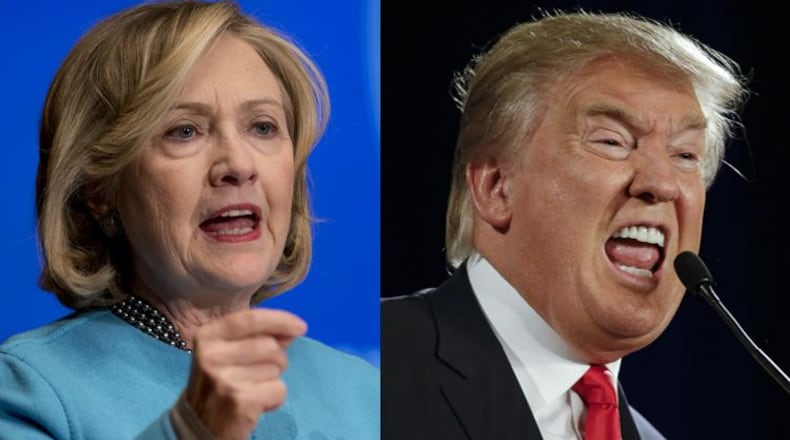The FBI decided not to recommend prosecution of Hillary Clinton for what agency head James Comey described Tuesday as her "extremely careless" handling of classified information via email during her tenure as secretary of State. This wasn't terribly surprising, except that Comey prefaced his announcement with extended remarks about how far over the legal line Clinton and her team had operated. It was always unlikely the presumptive nominee of a major party would be charged criminally with anything just four months before the election. That's not an exoneration of Clinton. It's just a recognition that in this country, it pays to be powerful -- and even more so to be on one's way to gaining more power.
That said, even without an indictment, any decently competent Republican nominee should be able to turn Comey's remarks into a legitimate and effective argument that Hillary shouldn't be allowed anywhere close to the White House for so much as a state dinner, much less to lead the free world. Comey knocked down every one of the excuses Team Clinton offered for her email use. She didn't just receive classified information; she also sent it. The information in question wasn't only "upclassified" after the fact, but was in fact classified at the time she sent/received it -- and it was her responsibility to know that. She didn't hand over all of her work-related emails; the FBI found some others on its own. She used her private, unsecured email while "in the territory of sophisticated adversaries," and not only in situations that probably weren't risky. Most damning were a couple of Comey's lines that ought to be replayed over and over and over again between now and Nov. 8:
- "there is evidence of potential violations of the statutes regarding the handling of classified information"; and
- "this is not to suggest that in similar circumstances, a person who engaged in this activity would face no consequences."
It's clear that Hillary received special treatment because of who she is. And that she lied about what she had done. Voters shouldn't tolerate that, and a decently competent Republican nominee should be able to make the case to them.
Unfortunately, the presumptive Republican nominee is Donald Trump .
There's no doubt that the decision not to indict Clinton fits thematically with what Trump has blasted as a "rigged system." It's of a piece with Bernie Sanders' message, although that was largely economic, and Trump has made some attempts to woo Sanders' supporters to his side.
But Trump also spent part of the Fourth of July defending his social media team's use of a meme apparently first used on a message board filled with anti-Semitic and neo-Nazi comments. A rule of thumb in politics and life in general: If you are explaining what you did wasn't really anti-Semitic, you're probably losing. A second rule of thumb: If your own problems distract from your opponent's, you're going to have a hard time winning.
And this gets to one of the basic problems with Trump as a candidate, setting aside whatever concerns someone ( cough, cough ) might have with Trump's policies and rhetoric: He's undisciplined in the extreme, and seemingly always inclined to turn media attention back to himself even when he'd benefit by letting his opponent drown in bad press.
From a political standpoint, the line to be walked isn't all that narrow: Hillary jeopardized national security for her personal convenience if not her paranoia; she has lied to the public repeatedly about what she'd done; her staff misled the FBI about how they'd handled the situation after it arose; she simply can't be trusted to oversee the entire national security apparatus with a track record like that.
But there are a few claims that lie outside those bounds, not on the smooth fairway of friendly fact but in the tall rough of unproven (indeed, probably unprovable) speculation: that President Obama ordered Comey to stop short of recommending prosecution; that Bill Clinton's private meeting with Attorney General Loretta Lynch just days ago (followed closely by the floating, in a New York Times article , of the possibility Lynch would remain in her job during a new Clinton presidency) signals that the fix was in; and so on. Can Republicans trust Trump to stick to the facts, which are bad enough for Hillary, and leave it to voters to fill in those other, unseemly assumptions on their own?
The track record of Candidate Trump suggests they can't. And that's a shame, because someone with Clinton's "extremely careless" approach to national secrets shouldn't be the president. A key premise of self-government is that the people will, with their votes, correct the problems that are bound to crop up in government on a regular basis. When political parties nominate unfit characters for any office, and especially the presidency, it is up to the people to reject blindly loyal tribalism.
The other candidate in that case is supposed to be able to make the argument in such a way as to free voters from the guilt of going against their usual "side." The abominable thing about 2016 so far is that neither Clinton nor Trump has proved up to that task.
About the Author
The Latest
Featured



